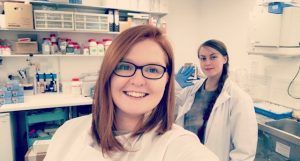
To mark the International Day of Women and Girls in Science, we focus on the women in our team at Examen who have worked tirelessly throughout the Covid-19 pandemic to help couples continue their fertility journey with the best chances of success.
The closure of fertility clinics at the beginning of the Covid-19 pandemic increased the strain on already desperate couples struggling with infertility issues. Many women will have become pregnant naturally during this time and anecdotes about a potential lockdown baby boom will be particularly hard to bear for these couples.
The Examen team recognises the agony of trying to start a family during these difficult times, particularly when trying to fathom out which fertility treatment is right for them, and then take measures to make every cycle of fertility treatment count. The team have worked relentlessly through the pandemic to keep Examen lab doors open and to continue offering our Exact sperm DNA tests to provide answers for men concerned about their fertility.
Deputy Lab Manager, Lynsey Poots, describes how we responded to news from the government that fertility clinics could re-open after the initial lockdown:
 “In June 2020, we sprang into action, adopting a shift rota so that we could resume service and help our patients get the answers they’d been waiting for. By August, the full team was back, working day and night to increase capacity, clear the backlog of tests, run the analysis and get results back to our partner fertility clinics as quickly as possible.
“In June 2020, we sprang into action, adopting a shift rota so that we could resume service and help our patients get the answers they’d been waiting for. By August, the full team was back, working day and night to increase capacity, clear the backlog of tests, run the analysis and get results back to our partner fertility clinics as quickly as possible.
“It wasn’t always easy due to the safety and social distance measures that will now be part of our daily routine for a while to come, and initially this, combined with processing the surge of test requests, presented a huge logistical challenge. Our commitment never wavered, we all worked towards the shared goal of empowering men to take control of their own fertility – finding answers led by science is why I chose to become a scientist in the first place!”
 Newest to the Examen team, research scientist Dr Erica Gardiner played a pivotal role in keeping things running smoothly, pulling shifts at unearthly hours and boosting her colleagues’ morale with her gregarious nature. Erica feels strongly that small nods of understanding, flexibility when she needed it and emails of thanks from patients and partner clinics are what motivated her to keep going through what was often a highly stressful time.
Newest to the Examen team, research scientist Dr Erica Gardiner played a pivotal role in keeping things running smoothly, pulling shifts at unearthly hours and boosting her colleagues’ morale with her gregarious nature. Erica feels strongly that small nods of understanding, flexibility when she needed it and emails of thanks from patients and partner clinics are what motivated her to keep going through what was often a highly stressful time.
“As a recent postgraduate, I had only been with Examen for one month before the pandemic hit. I was just beginning to find my feet when my world was knocked off course as we were suddenly in lockdown. I feel so lucky to be surrounded by such a wonderful team of scientists who have been an incredible source of support and inspiration throughout this difficult time. When everyone has to pull together to make positive progress in a really difficult situation you appreciate everyone’s different skill sets and it’s clear that the strength of a team is based on the differences of each individual.”
 As well as meeting the demands for Exact sperm DNA tests, we were determined to keep other important projects on track and on 26th October, our breakthrough fertility research was published on Reproductive BioMedicine Online. The study, led by R&D Manager Dr Lesley Haddock, demonstrates that sperm DNA damage is closely linked to miscarriage, and led to the launch of the EXACT Miscarriage test for fertility clinics to provide answers and help baby miracles happen. Lesley says:
As well as meeting the demands for Exact sperm DNA tests, we were determined to keep other important projects on track and on 26th October, our breakthrough fertility research was published on Reproductive BioMedicine Online. The study, led by R&D Manager Dr Lesley Haddock, demonstrates that sperm DNA damage is closely linked to miscarriage, and led to the launch of the EXACT Miscarriage test for fertility clinics to provide answers and help baby miracles happen. Lesley says:
“We really wanted to develop a way to predict the likelihood of couples suffering miscarriage based on sperm DNA quality, so the best treatment pathways could be chosen for patients to minimise their risk of pregnancy loss by miscarriage. With this test, men will be able to identify problems and engage with treatment plans to optimise their sperm quality, giving them the greatest possibility of fathering children. It’s great to see all our work translate into something tangible that will help people to have the families they dream of.”
Following this significant advance, we have accelerated plans to rebound more strongly than ever from the pandemic and give more men access to the infertility answers they deserve. Owing to increasing demand for EXACT tests, we appointed Eileen Regan to make our laboratories accessible to partner clinics outside of the UK and we are in the process of doubling the size of our facility with construction now underway.
 I have worked in fertility research for my whole career and have had to overcome a few challenges over the years as a woman in science. One of the biggest obstacles was to gain respect for my skills and experience, irrespective of my gender, since I worked in a very male environment. I remember at my first job interview I was asked how my husband felt about me taking on a demanding job.
I have worked in fertility research for my whole career and have had to overcome a few challenges over the years as a woman in science. One of the biggest obstacles was to gain respect for my skills and experience, irrespective of my gender, since I worked in a very male environment. I remember at my first job interview I was asked how my husband felt about me taking on a demanding job.
There was a hidden assumption that a man would do a better job than a woman. Being a tenacious person, it made me even more resolute in my goal to succeed. I am glad to say things have changed enormously. The fertility sector employs at least equal numbers of men and women now although men still own most of the clinics.
In order to make the scientific system more attractive to women, we need to make it easier for women to take maternity leave and then to resume their careers; especially in research. In Queens University, the Gender Initiative has made great strides forward in this area. Our national work force needs women but if they don’t take time out to have families, our decreasing birth rate will worsen with major impacts on our future economy. Men need to realise this too.
Thanks to my wonderful team of men and women. Whilst our work focuses on male fertility, the progress we are making relies on the amazing research of both men and women, and I would encourage anyone thinking of pursuing a career in science or medicine to go for it! Advances in fertility research change peoples’ lives and diversity of thought is what makes this progress happen.
For couples suffering with infertility reading this blog, rather than focusing on time lost, think about what you can do to regain control of your journey and make your next cycle count. A healthy diet, reducing alcohol, avoiding cigarettes, and getting plenty of exercise and good quality sleep are all simple steps that could significantly improve your sperm quality and the likelihood of a successful pregnancy. And these steps can be taken now – while you’re still in lockdown and potentially waiting for treatment.
Sheena



 “In June 2020, we sprang into action, adopting a shift rota so that we could resume service and help our patients get the answers they’d been waiting for. By August, the full team was back, working day and night to increase capacity, clear the backlog of tests, run the analysis and get results back to our partner fertility clinics as quickly as possible.
“In June 2020, we sprang into action, adopting a shift rota so that we could resume service and help our patients get the answers they’d been waiting for. By August, the full team was back, working day and night to increase capacity, clear the backlog of tests, run the analysis and get results back to our partner fertility clinics as quickly as possible. Newest to the Examen team, research scientist Dr Erica Gardiner played a pivotal role in keeping things running smoothly, pulling shifts at unearthly hours and boosting her colleagues’ morale with her gregarious nature. Erica feels strongly that small nods of understanding, flexibility when she needed it and emails of thanks from patients and partner clinics are what motivated her to keep going through what was often a highly stressful time.
Newest to the Examen team, research scientist Dr Erica Gardiner played a pivotal role in keeping things running smoothly, pulling shifts at unearthly hours and boosting her colleagues’ morale with her gregarious nature. Erica feels strongly that small nods of understanding, flexibility when she needed it and emails of thanks from patients and partner clinics are what motivated her to keep going through what was often a highly stressful time. As well as meeting the demands for Exact sperm DNA tests, we were determined to keep other important projects on track and on 26th October, our breakthrough fertility research was published on Reproductive BioMedicine Online. The study, led by R&D Manager Dr Lesley Haddock, demonstrates that sperm DNA damage is closely linked to miscarriage, and led to the launch of the EXACT Miscarriage test for fertility clinics to provide answers and help baby miracles happen. Lesley says:
As well as meeting the demands for Exact sperm DNA tests, we were determined to keep other important projects on track and on 26th October, our breakthrough fertility research was published on Reproductive BioMedicine Online. The study, led by R&D Manager Dr Lesley Haddock, demonstrates that sperm DNA damage is closely linked to miscarriage, and led to the launch of the EXACT Miscarriage test for fertility clinics to provide answers and help baby miracles happen. Lesley says: I have worked in fertility research for my whole career and have had to overcome a few challenges over the years as a woman in science. One of the biggest obstacles was to gain respect for my skills and experience, irrespective of my gender, since I worked in a very male environment. I remember at my first job interview I was asked how my husband felt about me taking on a demanding job.
I have worked in fertility research for my whole career and have had to overcome a few challenges over the years as a woman in science. One of the biggest obstacles was to gain respect for my skills and experience, irrespective of my gender, since I worked in a very male environment. I remember at my first job interview I was asked how my husband felt about me taking on a demanding job.
